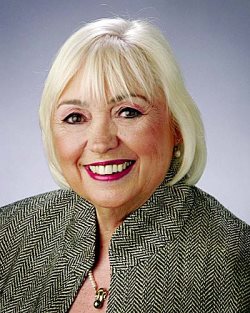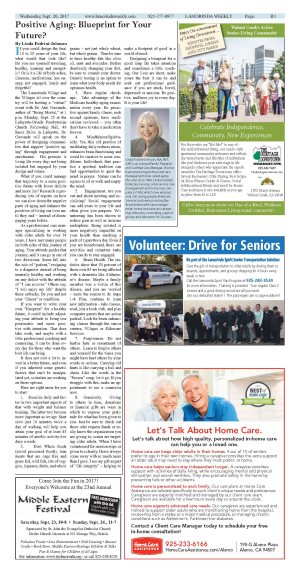| | Published September 20th, 2017
| Positive Aging: Blueprint for Your Future?
| | | By Linda Fodrini-Johnson |  | | Linda Fodrini-Johnson, MA, MFT, CMC is a Licensed Family Therapist and Certified Care Manager. She has been practicing professional care management (now called aging life care) since 1984. Linda founded Eldercare Services, a full-service care management and home care company in 1989, which now employs over 200 caring people. Eldercare Services has been providing Bay Area families with care management, home care services (caregiving), advocacy, counseling, support groups and education for 28 years. |
If you could design the final 10 to 20 years of your life, what would that look like? Do you see yourself traveling, healthy, learning and energetic? Or is it a life of body aches, illnesses, medications, less energy, not engaged, lonely and forgetful?
 The Lamorinda Village and the Villages all over the country will be hosting a "virtual" event with Dr. Atul Gawande, author of "Being Mortal," at 1 p.m. Monday, Sept. 25 at the Lafayette-Orinda Presbyterian Church Fellowship Hall, 49 Knox Drive in Lafayette. Dr. Gawande will speak on the power of designing communities that support "positive aging" through engagement and enrichment. His premise is living life every day; not being isolated but engaged by your design and values.
The Lamorinda Village and the Villages all over the country will be hosting a "virtual" event with Dr. Atul Gawande, author of "Being Mortal," at 1 p.m. Monday, Sept. 25 at the Lafayette-Orinda Presbyterian Church Fellowship Hall, 49 Knox Drive in Lafayette. Dr. Gawande will speak on the power of designing communities that support "positive aging" through engagement and enrichment. His premise is living life every day; not being isolated but engaged by your design and values.
 What if you could manage that trajectory to a more positive future with fewer deficits and more joy? Research is producing lots of reports on how we can slow down the negative parts of aging and enhance the positives of living our lives until they end - instead of disengaging years before.
What if you could manage that trajectory to a more positive future with fewer deficits and more joy? Research is producing lots of reports on how we can slow down the negative parts of aging and enhance the positives of living our lives until they end - instead of disengaging years before.
 As a professional care manager specializing in working with older adults for over 34 years, I have met many people on both sides of this journey of aging. Your attitude guides that journey, and it can go in one of two directions. Some fall into the role of "patient," resigning to a diagnosis instead of being mentally healthy and working on any deficit with the attitude of "I can recover." Others say, "I will enjoy my life" despite these setbacks. Be you and not your "illness" or condition.
As a professional care manager specializing in working with older adults for over 34 years, I have met many people on both sides of this journey of aging. Your attitude guides that journey, and it can go in one of two directions. Some fall into the role of "patient," resigning to a diagnosis instead of being mentally healthy and working on any deficit with the attitude of "I can recover." Others say, "I will enjoy my life" despite these setbacks. Be you and not your "illness" or condition.
 If you want to write your own "blueprint" for a healthy future, it could include adjusting your attitude to being less pessimistic and more positive with intention. That does take work, and maybe with a little professional coaching and counseling, it can be done every day for those who want the best life can bring.
If you want to write your own "blueprint" for a healthy future, it could include adjusting your attitude to being less pessimistic and more positive with intention. That does take work, and maybe with a little professional coaching and counseling, it can be done every day for those who want the best life can bring.
 It does not cost a lot to invest in a better future, and even if you inherited some genetic factors that can't be manipulated yet, scientists are working on those options.
It does not cost a lot to invest in a better future, and even if you inherited some genetic factors that can't be manipulated yet, scientists are working on those options.
 Here are eight areas for you to start:
Here are eight areas for you to start:
 1. Exercise daily and factor in two important aspects of that with weight and balance training. The latter two become more important as we age. Start slow just 10 minutes twice a day of walking will help you attain your goal of at least 45 minutes of aerobic activity five days a week.
1. Exercise daily and factor in two important aspects of that with weight and balance training. The latter two become more important as we age. Start slow just 10 minutes twice a day of walking will help you attain your goal of at least 45 minutes of aerobic activity five days a week.
 2. Diet: Whole foods (avoid processed foods), lean meats that are cage free and grass fed, wild fish, lots of veggies, legumes, fruits, and whole grains - not just whole wheat, but whole grains. Then be sure to have healthy fats like olive oil, nuts and avocados. Before drastically changing your diet, be sure to consult your doctor. Genetic testing is an option to learn what your body needs for optimum health.
2. Diet: Whole foods (avoid processed foods), lean meats that are cage free and grass fed, wild fish, lots of veggies, legumes, fruits, and whole grains - not just whole wheat, but whole grains. Then be sure to have healthy fats like olive oil, nuts and avocados. Before drastically changing your diet, be sure to consult your doctor. Genetic testing is an option to learn what your body needs for optimum health.
 3. Have regular checkups. Take advantage of the Medicare healthy aging examination every year. Be proactive against family illness, seek second opinions, have medications reviewed - you often don't have to take a medication forever.
3. Have regular checkups. Take advantage of the Medicare healthy aging examination every year. Be proactive against family illness, seek second opinions, have medications reviewed - you often don't have to take a medication forever.
 4. Mindfulness/Spirituality. Yes, this old practice of meditating daily reduces stress, enhances brain functioning and could be curative to some conditions. Individuals that practice a spiritual tradition can find opportunities to quiet the mind in prayer. Nature can be a place to sit or walk and empty the mind.
4. Mindfulness/Spirituality. Yes, this old practice of meditating daily reduces stress, enhances brain functioning and could be curative to some conditions. Individuals that practice a spiritual tradition can find opportunities to quiet the mind in prayer. Nature can be a place to sit or walk and empty the mind.
 5. Engagement. Are you out and about meeting and socializing? Social engagement can add years to your life and often gives you purpose. Volunteering has been shown to reduce pain as well as increase endorphins. Being isolated is more negatively impactful on your health than smoking a pack of cigarettes a day. Even if you are homebound, there are activities and volunteer tasks you can do to stay engaged.
5. Engagement. Are you out and about meeting and socializing? Social engagement can add years to your life and often gives you purpose. Volunteering has been shown to reduce pain as well as increase endorphins. Being isolated is more negatively impactful on your health than smoking a pack of cigarettes a day. Even if you are homebound, there are activities and volunteer tasks you can do to stay engaged.
 6. Brain Health. The statistics show that 50 percent of those over 85 are being affected with a dementia like Alzheimer's disease. Maybe a family member was a victim of this disease, and you are worried - more the reason to do steps 1-4. Plus, continue to learn new information - take classes, read, join a book club, and play computer games that are action packed. Look for brain enhancing classes through the senior centers, Villages or Eldercare Services.
6. Brain Health. The statistics show that 50 percent of those over 85 are being affected with a dementia like Alzheimer's disease. Maybe a family member was a victim of this disease, and you are worried - more the reason to do steps 1-4. Plus, continue to learn new information - take classes, read, join a book club, and play computer games that are action packed. Look for brain enhancing classes through the senior centers, Villages or Eldercare Services.
 7. Forgiveness. Do not harbor hate or resentment of others. Learn to forgive others and yourself for the times you might have hurt others by your words or actions. Carrying old hurts is like carrying a ball and chain. Like the words in the "Frozen" song: let it go. If you struggle with this, make an appointment to see a counselor now.
7. Forgiveness. Do not harbor hate or resentment of others. Learn to forgive others and yourself for the times you might have hurt others by your words or actions. Carrying old hurts is like carrying a ball and chain. Like the words in the "Frozen" song: let it go. If you struggle with this, make an appointment to see a counselor now.
 8. Generosity. Giving to others in time, donations or financial gifts are ways in which to express your gratitude for what has been given to you. Just be sure to check out those who request funds or really know the organization you are giving to; scams are targeting older adults. When I have volunteered for mission trips or given to a charity, I have always come away with so much more than I gave. I see my gift as part of "life integrity" - helping to make a footprint of good in a world of need.
8. Generosity. Giving to others in time, donations or financial gifts are ways in which to express your gratitude for what has been given to you. Just be sure to check out those who request funds or really know the organization you are giving to; scams are targeting older adults. When I have volunteered for mission trips or given to a charity, I have always come away with so much more than I gave. I see my gift as part of "life integrity" - helping to make a footprint of good in a world of need.
 Designing a blueprint for a good long life takes intention and sometimes a little coaching. Our lives are short, make yours the best it can be and seek out professional guidance if you are stuck, bored, depressed or anxious. Be positive, and have joy in every day. It is your life!
Designing a blueprint for a good long life takes intention and sometimes a little coaching. Our lives are short, make yours the best it can be and seek out professional guidance if you are stuck, bored, depressed or anxious. Be positive, and have joy in every day. It is your life!


|
| | | | | | | | | | | | |



